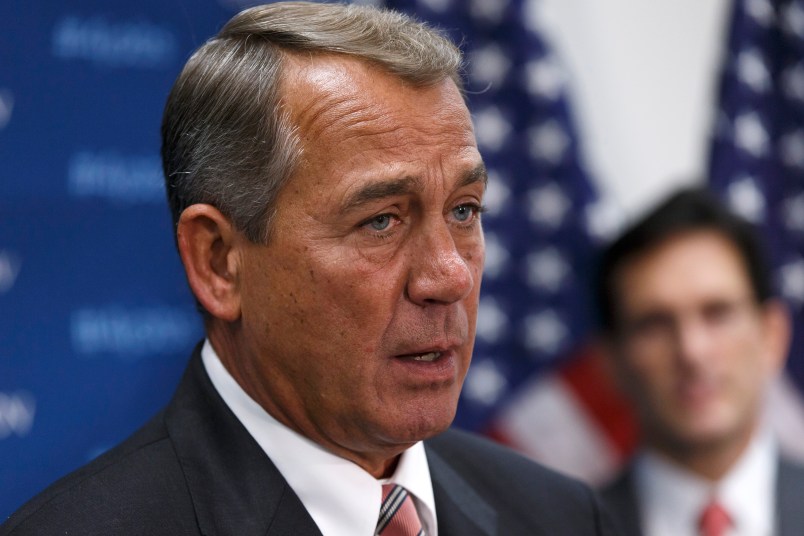House Republicans expect to vote this Friday on legislation that would risk steep, destabilizing Medicare cuts at the end of the month unless Democrats agree to a five-year delay of Obamacare’s individual mandate.
It mirrors some of the brinkmanship in the government shutdown fight last fall in that the GOP is using a must-pass bill as a vehicle to chop the Affordable Care Act. Democratic leaders have repeatedly rejected proposals to tinker with the mandate to buy insurance and have warned Republicans not to tie a physician payment fix to their partisan quest to unravel Obamacare.
“This is not credible, what they’ve done,” said Senate Majority Leader Harry Reid (D-NV).
The legislation would delay the penalty for noncompliance with the individual mandate until 2019. It suffered a blow on Wednesday when the Congressional Budget Office found that it would raise premiums and cause 13 million fewer people to be insured come 2018. It would save the federal government $170 billion and use the money to cover the $138 billion cost of replacing the Sustainable Growth Rate (SGR) formula, which calculates Medicare payments to physicians and will automatically impose a 24 percent pay on April 1 unless Congress acts.
The individual mandate is a sweet target for Republicans in an election year because it’s both unpopular and critical to the success of Obamacare. GOP leaders weren’t fazed by the CBO score and fast-tracked the bill to a Friday vote.
Insurance industry wrote a letter this week calling on Speaker John Boehner (R-OH) to leave the individual mandate alone, warning of higher premiums if it’s unraveled. Even the top physicians group, the American Medical Association, which has made SGR repeal a priority, voiced disappointment with the partisan direction the issue has taken.
“Congress has never been closer to repealing the dysfunctional payment system because both parties worked together in a bicameral process to develop good-faith consensus. It would be a shame for lawmakers to have done all of that hard work for nothing,” AMA President Ardis Dee Hoven said in a statement.
The big question is whether Republicans will hold firm on the individual mandate pay-for or relent and look elsewhere. Democratic aides say the battle could get ugly.
The path forward is murky but bends toward yet another short-term patch to put off the Medicare cuts. Senate Democrats moved to advance an unfunded SGR replacement on Wednesday, which won’t fly with Republicans. And an individual mandate delay won’t fly with Democrats or the White House. So the likelier outcome is a bipartisan deal for a short-term patch, plausibly funded with different cuts to health providers.
But there’s no clear endgame on how to get there, or whether Congress can make it in time. The House can probably pass the GOP bill. But Senate Democrats need at least five Republicans to break a filibuster on their own “clean” SGR bill. So it may be left to Reid to scrape off enough of them to steer a short-term SGR fix through the Senate and pressure House GOP leaders to play ball. He has put out feelers but so far no solution has emerged.
The steep Medicare cuts are less than three weeks away. If they aren’t stopped in time, Congress could pass a retroactive fix, but it may cause a shock to the health care system. Some expect an SGR replacement to be brought up after the 2014 elections in the lame-duck session.






